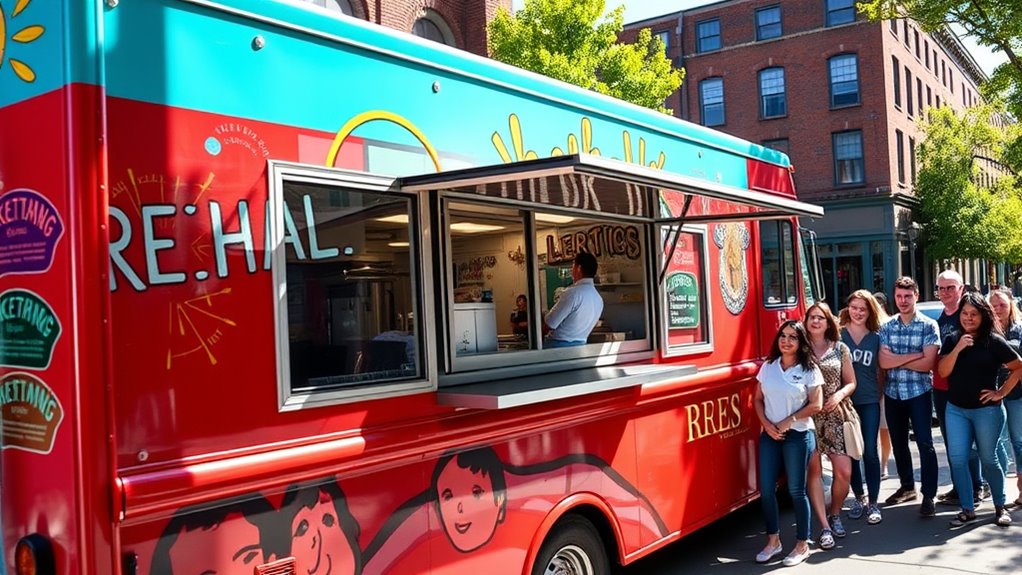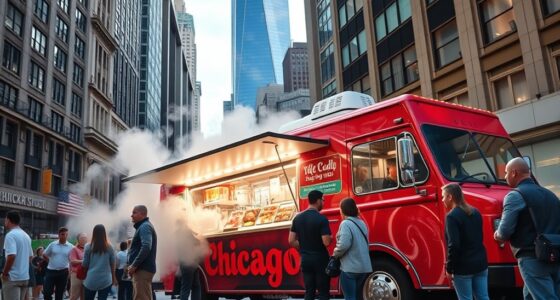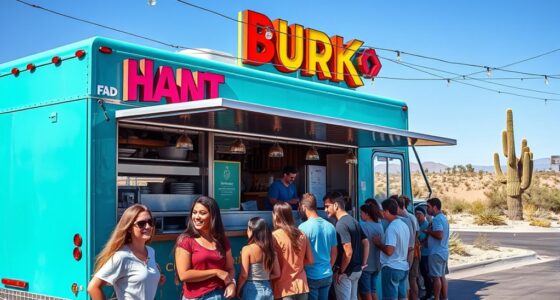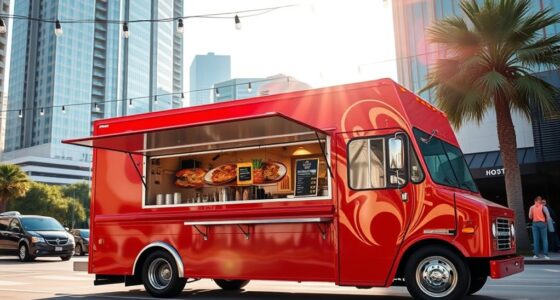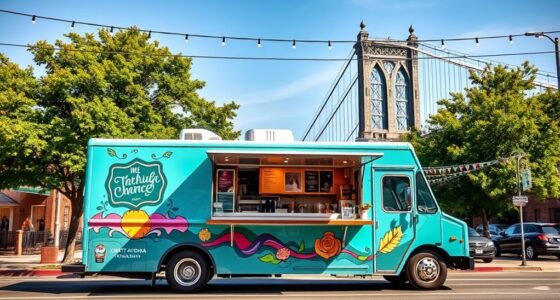To start a food truck in Richmond, VA, you need to obtain the necessary permits, register with the city, and comply with health and safety regulations. Find a legal parking zone and set up your shared kitchen license if needed. Develop a menu focused on local flavors, use technology for efficiency, and plan marketing strategies like social media promotions and community events. If you want detailed steps to launch and grow, keep going to explore all the essentials.
Key Takeaways
- Obtain necessary permits, licenses, and registration through Richmond’s online portal to ensure legal operation.
- Identify designated street parking zones and plan your location to avoid fines and towing.
- Secure shared kitchen licensing and set up compliant, efficient kitchen and truck equipment.
- Develop a menu focused on local flavors, and implement technology for sales, inventory, and customer engagement.
- Use social media and community events to promote your food truck and build relationships with local vendors.
Starting With a Food Truck License
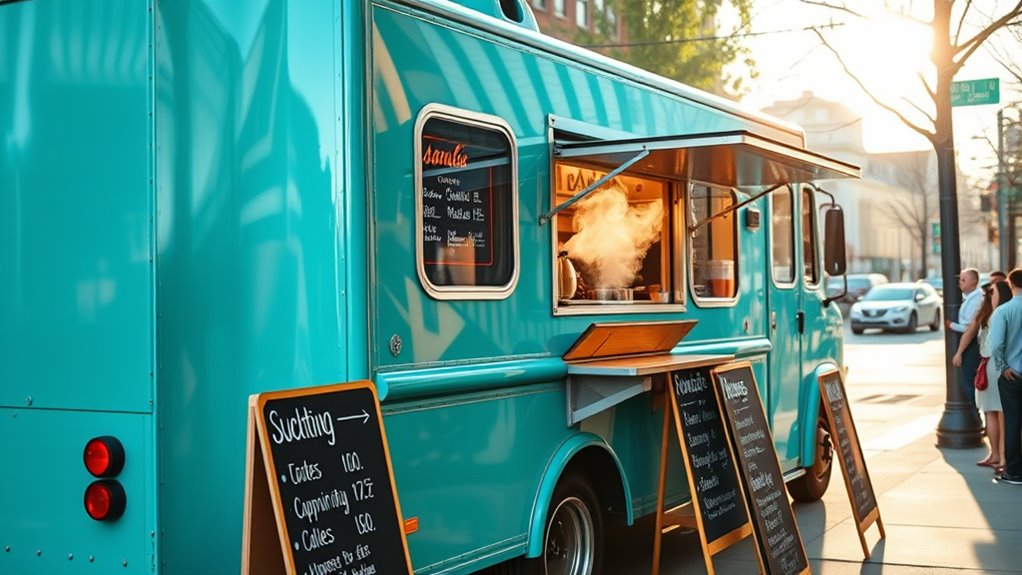
Getting your food truck license is the essential first step before hitting the streets of Richmond. To do this, you’ll need to secure the necessary food truck permits, which guarantee your truck complies with local health and safety standards. Start by registering as a vendor with the city, a process called vendor registration, which establishes your business officially. This registration often involves providing proof of insurance, a food handler’s permit, and vehicle documentation. Once you complete these steps, you’ll receive the permits required to operate legally. Remember, these permits and registration are crucial for avoiding fines and ensuring your truck is recognized as a legitimate business. Additionally, understanding the importance of projector technology can help you create an engaging and appealing setup if you plan to promote your food truck or host events. Getting everything in order upfront makes launching your food truck venture smooth and compliant with local regulations.
Understanding Local Requirements
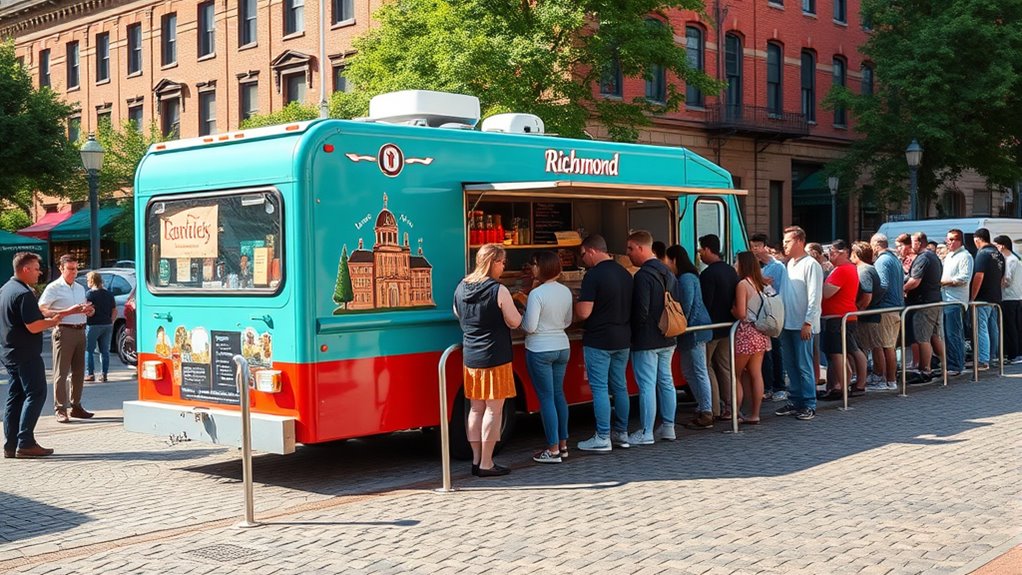
To keep your food truck compliant, you’ll need to use the online permit application portal for permits and approvals. Make sure you comprehend Richmond’s sanitation standards to avoid violations that could shut you down. Also, familiarize yourself with designated street parking zones to ensure you’re operating legally and efficiently. Checking local hours of operation can help you plan your schedule effectively and stay within permitted times.
Online Permit Application Portal
The Richmond online permit application portal simplifies the process of obtaining necessary licenses for your food truck. Instead of visiting multiple offices, you can submit applications digitally, saving time and reducing hassle. The portal also streamlines compliance with local requirements, ensuring you meet all regulations before opening. As you prepare, consider how your digital storefronts and online ordering systems fit within the city’s licensing framework. Having clear permits will allow you to operate smoothly and avoid fines. The portal provides detailed instructions and status updates, so you stay informed throughout the process. By using this centralized platform, you gain quick access to essential permits, making your progression into Richmond’s food scene more efficient and less stressful.
Sanitation Standards and Violations
Understanding local sanitation standards is essential for keeping your food truck compliant and safe. You must follow specific food safety regulations and adhere to strict cleaning protocols to prevent contamination and violations. Richmond’s health department enforces these standards through regular inspections, focusing on proper food handling, storage, and sanitation practices. Violations such as improper food temperatures, unclean surfaces, or inadequate handwashing stations can lead to fines or shutdowns. To stay compliant, implement daily cleaning routines, sanitize all surfaces regularly, and train staff on hygiene practices. Staying vigilant about sanitation not only protects your customers but also ensures your food truck runs smoothly without costly penalties. Prioritize food safety and maintain spotless standards to build a trusted reputation in Richmond’s vibrant food scene.
Designated Street Parking Zones
Navigating Richmond’s street parking regulations is crucial for operating your food truck legally and efficiently. You need to identify designated street parking zones to avoid fines and parking enforcement issues. These zones specify where trucks can park, often with specific times and restrictions. Failing to follow these rules can lead to costly street parking fees or towing. Always check signs for zone boundaries and parking durations. Remember, parking enforcement actively monitors these areas to ensure compliance. Use the table below to understand typical zone details:
| Zone Type | Parking Hours & Fees |
|---|---|
| Commercial | 8 am – 6 pm, $2 per hour |
| Residential | 7 am – 7 pm, no fees |
| Loading | Limited to 30 minutes, free |
| Event | Varies, often permit required |
| Restricted | No parking, violators fined |
Stay informed, and you’ll keep your truck running smoothly.
Setting Up Your Base of Operations
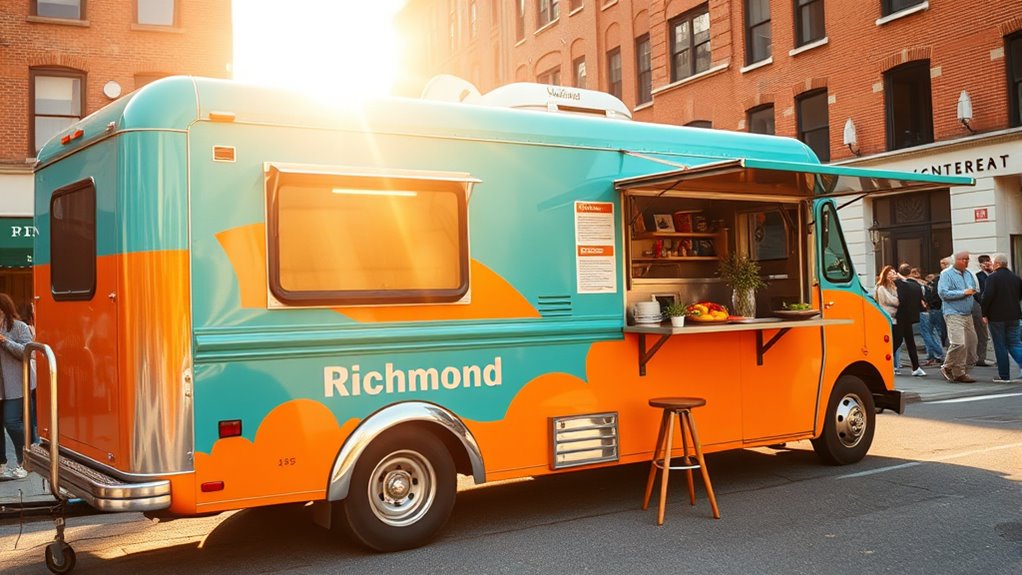
When setting up your base of operations, you’ll need to take into account shared kitchen licensing requirements to stay compliant with local regulations. Planning your custom kitchen layout carefully can improve efficiency and meet health standards. Ensuring these elements are in place helps you operate smoothly and focus on serving great food. Additionally, understanding permitting and inspections ensures your setup aligns with local building codes and zoning regulations.
Shared Kitchen Licensing Requirements
Setting up your food truck’s base of operations often involves securing a shared kitchen, which requires meeting specific licensing requirements. When engaging in kitchen sharing, you must establish clear licensing agreements that specify usage rights and safety standards. These agreements ensure compliance with local health regulations and protect your business. To get started, you’ll need to:
- Obtain a shared kitchen license from the local health department
- Ensure the kitchen meets all sanitation and safety standards
- Register your business and food establishment with the city
- Comply with state and local food handling permits
- Maintain proper documentation of licensing agreements for inspections
Custom Kitchen Layout Planning
Designing your custom kitchen layout is a crucial step to guarantee efficiency, safety, and compliance with health standards. Focus on optimizing kitchen ergonomics to reduce fatigue and improve workflow. A well-planned layout enhances layout efficiency, allowing you to move seamlessly between prep stations, cooking areas, and storage. Consider the placement of appliances, sinks, and work surfaces to minimize unnecessary movement and prevent cross-contamination. Use a logical flow that mirrors the order of food preparation, from raw ingredients to serving. Make sure enough space for staff to work comfortably and safely. Incorporate safety features like slip-resistant flooring and easy access to fire extinguishers. A carefully designed kitchen layout helps streamline operations, saves time, and maintains high-quality standards essential for a successful food truck business.
Budgeting and Financing Your Food Truck

To get your food truck off the ground, you need to plan for initial equipment costs and figure out how to finance them. Applying for a loan involves meeting specific requirements, so understanding the process helps you prepare. Additionally, securing liability coverage guarantees your mobile business stays protected as you serve customers around Richmond. Conducting a thorough risk assessment can help identify potential vulnerabilities and ensure your business is well-prepared for any challenges.
Initial Equipment Investment Costs
Starting a food truck in Richmond, VA requires a clear understanding of your initial equipment costs, which can vary widely depending on your menu and truck size. These costs include essential appliances, cooking tools, and the truck itself. Budgeting accurately helps you plan for equipment maintenance and vendor sourcing, ensuring you get quality gear without overspending.
Key items to consider are:
- Commercial kitchen appliances (grills, fryers, refrigerators)
- Food prep and storage equipment
- Point-of-sale systems
- Truck modifications and branding
- Safety equipment and licenses
Investing wisely in durable equipment minimizes long-term repair costs, and establishing relationships with reliable vendors ensures consistent supplies. Proper planning now sets a solid foundation for your food truck’s success in Richmond.
Loan Application Process and Requirements
Securing funding for your food truck in Richmond, VA involves understanding the loan application process and its requirements. You’ll need a solid business plan, proof of income, and a good credit score. Lenders also consider your ability to handle truck maintenance costs and maintain food safety standards. Be prepared to provide detailed financial statements and collateral. Here’s a quick overview:
| Document Needed | Purpose | Tips |
|---|---|---|
| Business plan | Demonstrates growth potential | Highlight food safety and maintenance plans |
| Personal credit report | Assesses creditworthiness | Address any issues beforehand |
| Financial statements | Shows financial health | Keep records organized |
| Collateral details | Secures the loan | Include truck assets |
| Proof of income | Verifies repayment ability | Gather recent pay stubs |
Following these steps helps streamline your loan approval process.
Liability Coverage for Mobile Units
Liability coverage is a critical aspect of budgeting and financing your food truck, especially since mobile units face unique risks on the road and at various locations. Protecting yourself with proper liability coverage helps cover damages or injuries caused by your mobile units, reducing financial strain. When budgeting, consider the costs associated with liability insurance to guarantee you’re fully protected.
Key considerations include:
- Coverage for accidents involving your mobile units
- Liability limits suitable for your operation size
- Protection against customer injuries
- Coverage for property damage
- Additional coverage for roadside incidents
Having extensive liability coverage not only safeguards your investment but also builds trust with customers and vendors, ensuring your food truck business remains financially secure.
Designing Your Menu and Pricing Strategy
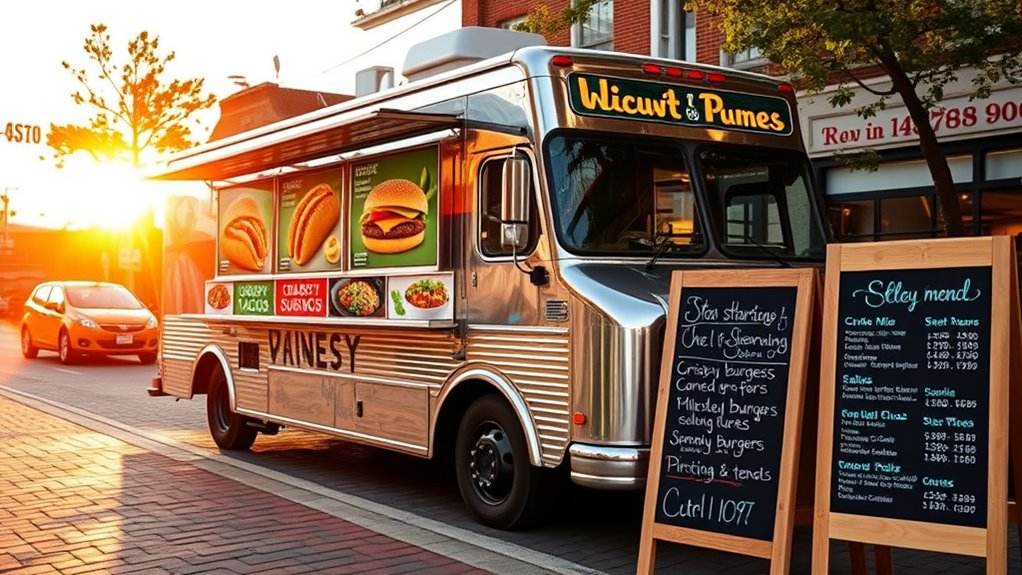
When designing your menu, focus on incorporating local flavors that resonate with Richmond’s community. To set your prices, accurately calculate ingredient costs using methods like food cost percentage or markup strategies. This approach guarantees your offerings are appealing while maintaining profitability. Additionally, consider offering diverse shower fixtures that cater to different customer preferences and enhance your food truck’s appeal.
Locally Inspired Menu Crafting
Have you considered how your menu can reflect the unique flavors and culture of Richmond? Crafting a locally inspired cuisine allows you to showcase regional flavor combinations that resonate with the community. Focus on dishes that highlight Virginia’s farm fresh ingredients and Southern influences. Use seasonal produce and local proteins to create authentic offerings. Incorporate these ideas:
- Classic Virginia barbecue with a modern twist
- Shrimp and grits inspired by Southern coastal flavors
- Farm-to-table salads featuring local greens and herbs
- Soul food-inspired sandwiches with regional spices
- Dessert options using Virginia-grown fruits and honey
Ingredient Cost Calculation Methods
Developing a locally inspired menu is only the first step; setting the right prices guarantees your food truck remains profitable while appealing to customers. To do this, you need accurate ingredient cost calculation methods. Start by measuring ingredients precisely, as small errors can profoundly impact your profit margins. Use cost estimation techniques to determine the true expense of each item, considering ingredient measurement, packaging, and waste. Here’s a simple way to organize your costs:
| Ingredient | Cost per Measurement |
|---|---|
| Chicken | $2.50 per pound |
| Vegetables | $1.00 per cup |
| Spices | $0.10 per gram |
This helps you set competitive prices that cover costs and ensure profitability. Proper calculation is key to sustainable success.
Technology and Operations
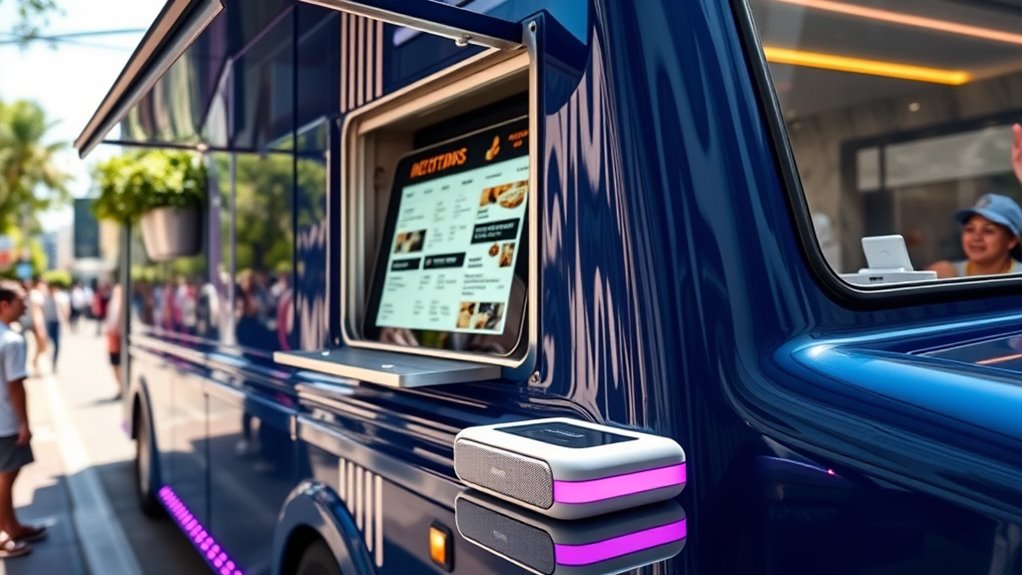
Using mobile card readers and apps can streamline your sales and reduce wait times. Real-time stock tracking software helps you stay on top of inventory and avoid shortages. Incorporating these technologies keeps your operations smooth and efficient.
Mobile Card Readers and Apps
Mobile card readers and apps have become essential tools for food trucks in Richmond, VA, streamlining transactions and enhancing customer experience. With mobile payment options and contactless transactions, you can serve customers quickly and safely. These devices make it easy to accept various payment methods, reducing wait times and increasing sales. Plus, they improve record-keeping, helping you track sales effortlessly.
Consider these features:
- Compatibility with smartphones and tablets
- Support for multiple payment types
- Quick setup and easy use
- Secure encryption for customer data
- Integration with point-of-sale systems
Real-Time Stock Tracking Software
To keep your food truck running smoothly, real-time stock tracking software provides instant updates on inventory levels, allowing you to make informed decisions quickly. With effective inventory management, you can monitor stock levels accurately, reducing waste and avoiding shortages. This technology also enhances menu customization by revealing popular ingredients and items, helping you adapt your offerings based on current inventory. By integrating real-time stock tracking, you gain better control over stock replenishment and can optimize procurement processes. This ensures you’re always prepared for busy days and special events. Overall, using this software streamlines operations, minimizes errors, and keeps your menu fresh and appealing to customers. Staying on top of inventory with real-time data empowers you to run a more efficient and profitable food truck.
Marketing and Growing Your Presence
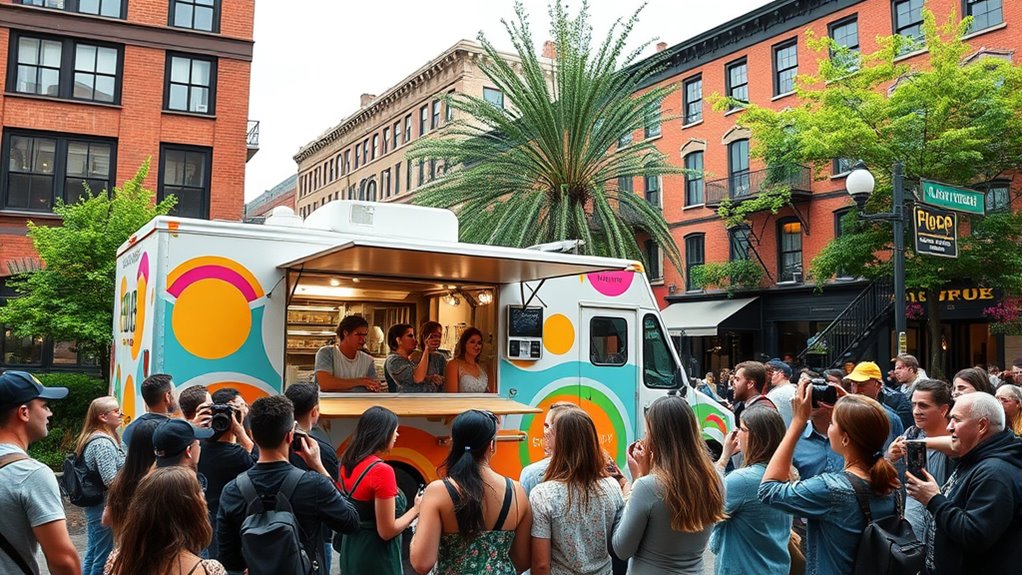
To boost your presence, focus on scheduling your weekly events at popular spots to attract regular customers. Create interactive Instagram campaigns, like polls or photo contests, to engage your audience and increase visibility. Consistently combining these strategies helps you grow your following and build a loyal customer base in Richmond.
Weekly Event Scheduling Tips
Consistent weekly scheduling is key to building a loyal customer base and increasing your food truck’s visibility. When you set specific days and times, it becomes easier to plan effective event promotion and foster community engagement. To maximize your impact, consider these tips:
- Choose regular days and locations to establish consistency.
- Promote upcoming events early through social media and local listings.
- Partner with local businesses or community groups to boost visibility.
- Attend community events to strengthen your presence.
- Gather feedback from customers to refine your schedule and offerings.
Interactive Instagram Campaigns
Interactive Instagram campaigns are a powerful way to engage your audience and grow your food truck’s online presence. By running Instagram contests, you encourage followers to share photos, tag your account, or use specific hashtags. These contests create buzz and foster a sense of community around your brand. Additionally, hashtag campaigns make it easy for users to find and participate in your promotions. To maximize impact, craft clear rules and appealing prizes that motivate participation. Use eye-catching visuals and compelling calls-to-action to inspire users to join the conversation. Consistently engaging with participants by liking, commenting, and sharing their content boosts visibility and loyalty. With strategic Instagram contests and hashtag campaigns, you’ll turn followers into loyal customers and elevate your food truck’s reputation in Richmond, VA.
Networking With Local Vendors
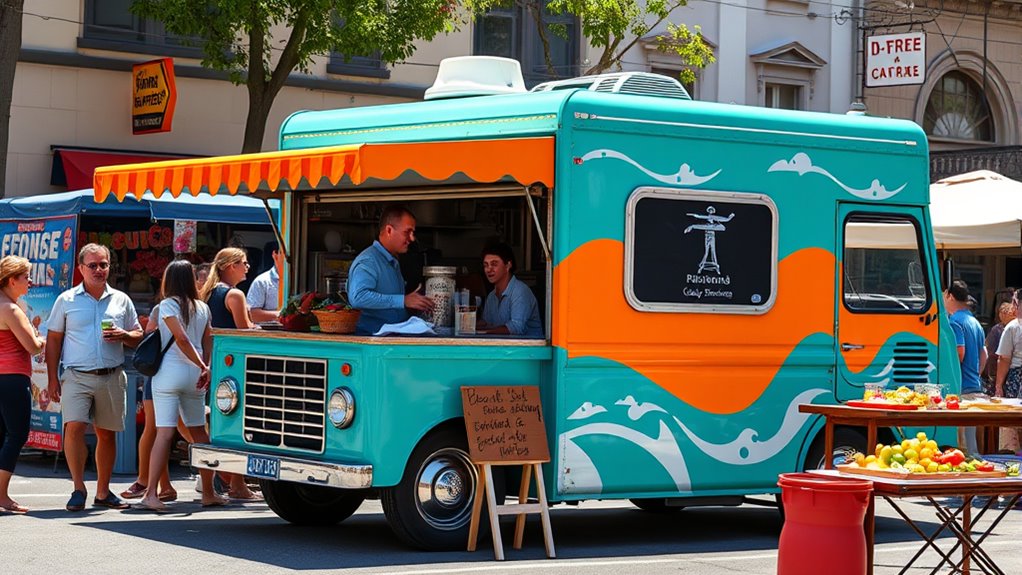
Building strong relationships with local vendors is essential for a food truck’s success in Richmond, VA. Connecting with nearby vendors can open doors to opportunities like participating in local food festivals and joint marketing efforts. To strengthen these relationships, consider attending vendor collaboration tips, such as sharing resources or cross-promoting on social media. These collaborations boost visibility and help you establish a trusted network within the community.
Here are some ways to network effectively:
- Attend local food festivals to meet potential partners
- Visit vendor markets regularly to build rapport
- Offer to collaborate on promotional events
- Share contact info for future opportunities
- Support other vendors’ events and initiatives
Building these connections will grow your reputation and customer base.
Frequently Asked Questions
What Permits Are Required Beyond the Food Truck License in Richmond?
Beyond your food truck license, you’ll need to obtain vendor permits and understand parking regulations in Richmond. These permits guarantee you’re authorized to operate in specific areas, while parking rules dictate where you can set up. Check with the Richmond Department of Planning and Development for detailed requirements. Staying compliant helps you avoid fines and makes your food truck business run smoothly, attracting more customers and building a good reputation.
How Do I Find the Best Locations for Food Truck Events in Richmond?
To find the best locations for food truck events in Richmond, VA, research popular spots like downtown, near parks, or at local festivals. Check parking regulations to guarantee you’re allowed to set up there and look for event sponsorship opportunities that attract crowds. Connect with event organizers or local business associations to discover scheduled events and secure prime spots, maximizing your visibility and sales.
What Are the Common Challenges Faced by New Food Truck Entrepreneurs Here?
As a new food truck entrepreneur in Richmond, VA, you’ll face challenges like developing effective marketing strategies to attract customers and standing out. Staff recruitment can also be tough, as you need reliable, skilled workers to keep operations smooth. Balancing these aspects while managing costs and maneuvering local regulations can be overwhelming, but focusing on targeted marketing and building a strong team will help you succeed in the competitive food scene.
How Can I Build a Loyal Customer Base in Richmond’s Food Scene?
You can build a loyal customer base in Richmond’s food scene by implementing strong branding strategies that showcase your unique offerings. Engage actively on social media to connect with locals, share behind-the-scenes content, and promote special events. Consistency in quality and service also encourages repeat visits. By fostering genuine relationships and creating memorable experiences, you’ll turn first-time customers into loyal supporters who spread the word about your food truck.
Are There Specific Health and Safety Standards Unique to Richmond?
Yes, Richmond has specific health and safety standards you must follow. You need to pass local health inspections that guarantee your truck complies with Richmond safety regulations, including proper food handling, sanitation, and equipment standards. Stay updated on any changes to these regulations by consulting the Richmond Department of Health. Regularly maintaining cleanliness and documentation will help you pass inspections smoothly and build trust with your customers.
Conclusion
Starting a food truck in Richmond, VA, is a smart move if you’re ready to embrace local tastes and build a loyal following. Many believe food trucks thrive solely on great food, but success also hinges on understanding regulations, smart marketing, and networking. With the right planning and passion, you can turn your food truck into a popular staple in Richmond’s bustling food scene. So, is the true secret simply passion plus preparation? Give it a shot and see!
